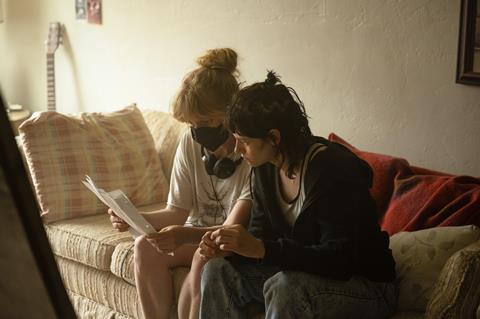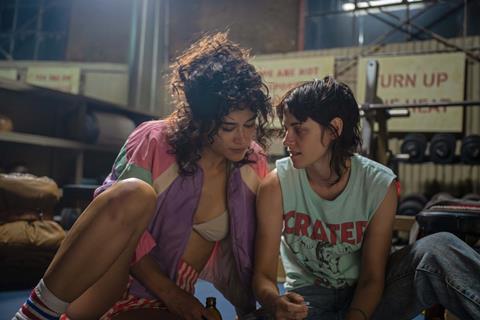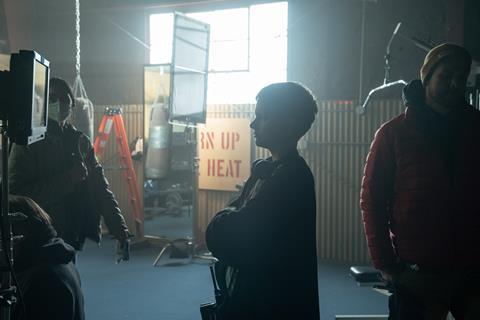Rose Glass and her ‘Love Lies Bleeding’ co-writer Weronika Tofilska on making their uncompromising US-set crime thriller.

Making its festival debut in 2019, Saint Maud, the debut feature from UK writer/director Rose Glass, was widely heralded as one of the best British films of the year. It was nominated for two Baftas, won best debut director and cinematography at the British Independent Film Awards (Bifas), and scooped best actress for Morfydd Clark at the Bafta Cymru Awards.
An impressive calling card by any standards – and even, some may have thought, a reusable blueprint for success. But when it came to making her follow-up, Glass – a 2018 Screen International Star of Tomorrow – was determined not to plough the same furrow.
Whereas Saint Maud was the relatively small-scale story of a pious nurse trying to save the soul of her dying patient in a British seaside town, Love Lies Bleeding is an uncompromising 1980s New Mexico-set crime thriller that follows the intense relationship between the insular Lou (Kristen Stewart) and ambitious bodybuilder Jackie (Katy O’Brian). The Sundance premiere enjoyed a healthy festival run before opening in the US in March (through A24) and the UK in May (Lionsgate).
“The idea came towards the tail end of finishing Saint Maud,” says Glass, speaking to Screen the week that Love Lies Bleeding achieved an impressive 12 Bifa nominations, “and the urge was to do something that felt more spontaneous. A female bodybuilder who was unravelling while training for a competition felt like an exciting starting point.”
Having written Saint Maud alone – a process she calls “incredibly stressful” – Glass approached Polish writer/filmmaker Weronika Tofilska, a friend from the National Film and Television School, to collaborate on the screenplay.
“We had always helped each other with projects, read each other’s scripts,” says Tofilska, who has made shorts and directed for television, including the first four episodes of Netflix hit Baby Reindeer. “She told me about this idea, and I was excited to jump in.”
The pair rented an office, mapping out the film and “figuring out what would be the most exciting turn of events”, says Glass, who describes the process as “sociable and fun” with plenty of “constructive arguing”.
“We spent a long time putting things on the board, talking about structure and shifting things around,” recalls Tofilska. “We ended up with a treatment that was almost like a short script. Rose took that draft and did a first pass, then I rewrote some things and we kept swapping around. At some point, the changes became smaller and then we were writing together on the same file. It worked really well.”
While Glass had been thinking about setting the film in Soho, London during the 1960s – “I didn’t want it to take place in the here and now” – she says the pair also discussed shifting the action to Scotland.
“We figured out that, because of the nature of the bodybuilding world, it would be an unusual thing for someone from Scotland to do,” says Tofilska, with a smile. “We hit on the idea of Las Vegas being the symbol of Jackie’s ambition.”
“The story is a big romance, but there’s also a lot of violence, and the dusty American outback seemed like a good, almost-mythological backdrop,” says Glass. “Once we started looking for somewhere to shoot, New Mexico emerged as the best place. We wanted it to feel as if the town was its own satellite world in this vast landscape, cut off from everyone else.”
Solid support

With the emergence of this brash American vision, which would require a much larger budget than the $2.5m she had for Saint Maud, Glass knew she would need to surround herself with a tried-and-tested support system – returning to Saint Maud producers Andrea Cornwell of Lobo Films and Oliver Kassman of Escape Plan Productions.
“The scale [of Love Lies Bleeding] was quite a step up from Saint Maud and was quite daunting. So having Oliver and Andrea as key collaborators was invaluable,” says Glass, who also recruited Saint Maud cinematographer Ben Fordesman and editor Mark Towns.
As with their previous film, the team developed the project with Film4, and then went to A24, which had released Saint Maud in the US, for financing.
Glass recalls the company being “very accepting and enthusiastic” – essential for a project that has copious amounts of violence and two central characters who do increasingly despicable things, all without losing the audience’s sympathy.
“One of the great things about writing with Rose is that she doesn’t shy away from bold ideas, and she doesn’t like predictability,” says Tofilska. “We saw the film as being about the thin line between love and violence.”
“It was a fun line to navigate,” says Glass. “We wanted it to be the case that you’re always rooting for [Lou and Jackie]. That’s why the film’s humour was important to us. We just liked the idea of seeing how awfully we could get these women to behave and still have people cheer them on.”
Key to that aim was casting, and one name was in the mix from early on. “Kristen Stewart felt like a natural choice,” says Tofilska. “Once she was in our head, we couldn’t stop thinking about her as Lou, and we wrote with her in mind.”
“I met her, she read the script and said yes. It was such a natural fit,” says Glass. “Jackie was more difficult to cast. I always knew I wanted to find an actual bodybuilder, not follow the suggestion that we go for a familiar face and get them to bulk up. I wanted authenticity. We had lots of auditions with athletes and then, fortunately, Katy saw an ad on Twitter for the role. She is an actor, but she has competed in bodybuilding and is a martial artist. It was a huge relief when we met her for the first time.”
The cast rounded out with Ed Harris as Lou’s estranged father, Jena Malone, Anna Baryshnikov and Dave Franco for a New Mexico shoot in the summer of 2022 – and, although Tofilska could not be on set as she was filming Baby Reindeer, she remained involved.
“I had Zoom sessions with Rose when she was in prep, and there were things [in the script] that needed to change in line with locations.” Glass sent pictures and scenes to her writing partner once filming began so she could stay connected with the project.
Bigger picture

After a tumultuous journey to the bodybuilding championships in Las Vegas in which Lou and Jackie leave a pile of bodies in their wake, the film builds to a bravura surreal climax which, admits Glass, has “divided audiences”.
The idea of Jackie undergoing a fantastical physical transformation felt, she says, “natural – that she embody, on a literal level, what she has been doing in a slightly more abstract sense throughout”.
“We came up with that ending early but then we took it out, in a kind of ‘We can’t do that!’ way,” adds Glass, who is currently in the “blood from a stone, procrastinating phase” of penning her next feature.
“We just kept writing other endings, which were more literal. The big confrontation with Lou’s dad, the reconciliation [between Lou and Jackie], the drive off into the sunset. But it felt like the emotional culmination wasn’t quite landing, and the film had by that point been hinting that something fantastical was going to happen. So we just thought, ‘Fuck it.’
“I stand by it. It felt like the most satisfying full stop.”







![The Brightest SunScreen[Courtesy HKIFF]](https://d1nslcd7m2225b.cloudfront.net/Pictures/274x183/3/5/0/1448350_thebrightestsunscreencourtesyhkiff_312678.jpg)

















No comments yet